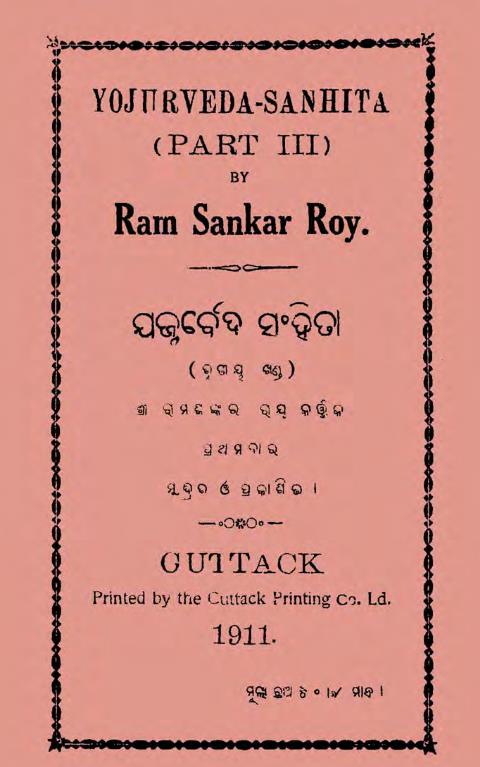The Odia language carries a rich tapestry of literature, philosophy, and spirituality. Among the many gems of Odia literature, the Jajurbeda Samhita, penned by Ramasankar Ray and published in 1911, stands out as an essential text that bridges ancient wisdom with contemporary understanding. This significant work comprises a collection of slokas, accompanied by annotations that delve into the meanings and implications of these verses.
The Slokas: Spiritual Verses of the Jajurbeda Samhita
At its core, the Jajurbeda Samhita consists of a series of slokas that encapsulate profound spiritual insights and philosophical reflections. Each sloka, crafted in poetic form, captures the essence of Vedic thought, grounded in the ancient traditions of Hinduism. These verses traditionally serve as guides for personal introspection and ethical living.
The slokas address various thematic elements—ranging from the nature of the self (Atman) and the universe (Brahman) to ethics, devotion (Bhakti), and the pursuit of knowledge (Jnana). Through rhythmic language and metaphor, the verses invite readers to reflect on their own existence, encouraging a journey towards self-realization and understanding the intricate relationship between the individual soul and the cosmic whole.
Annotation: Unveiling Deeper Meanings
Ramasankar Ray’s contribution does not end with the mere presentation of slokas; it extends into careful annotation and commentary that elucidates the contextual meanings behind each verse. Ray’s annotations serve multiple purposes: they provide clarity for the modern reader, draw connections to historical interpretations, and enrich the text with cultural references.
In his annotations, Ray interlaces snippets of historical anecdotes, personal interpretations, and philosophical discourse that contextualize the slokas within the broader spectrum of Odia and Vedic literature. By lingering on word meanings and metaphysical implications, he opens doors to deeper understanding and appreciation of the nuances embedded in each verse.
Vedic Philosophical Foundations
The Jajurbeda Samhita is not merely a collection of religious verses; it is rooted in a robust philosophical framework derived from ancient Vedic scriptures. Its philosophical underpinnings resonate with core concepts of Hindu thought—such as Dharma (duty), Karma (action), and Moksha (liberation).
This philosophical foundation is often reflected in the ethical guidelines laid out in the slokas, suggesting that each individual has a role to play in the cosmic order. Ray’s annotations help readers understand how these ancient principles can still be relevant in navigating modern dilemmas, thus promoting a harmonious existence grounded in ethics and self-awareness.
Conclusion: A Significant Literary Contribution
The Jajurbeda Samhita is a remarkable literary achievement that not only enriches the Odia language and literature but also reaffirms the importance of philosophical inquiry and spiritual wisdom in contemporary life. Ramasankar Ray’s combined effort of presenting slokas alongside insightful annotations serves as a bridge, connecting the past with the present while inviting readers to embark on a journey of understanding and introspection.
As we delve into the layers of this sacred text, we are reminded of the enduring nature of Vedic wisdom and its relevance in shaping our thoughts, lives, and values. The Jajurbeda Samhita stands as a testament to the depth and richness of Odia cultural heritage, illuminating the path of self-discovery through the timeless teachings it embodies.
Books Info
| Books name | Jajurbeda Samhita/ଜଦୂର୍ବେଦ ସଂହିତା |
| Author | Ramasankar Ray |
| No Of pages | 52 |
| Publisher | NA |
| Publication | 1991 |
| Printed At | NA |
| Distributor | NA |

